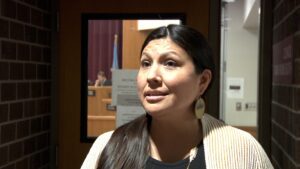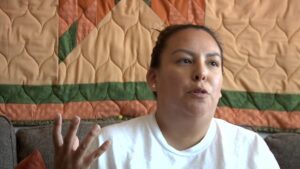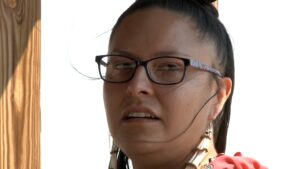Rapid City community asks feds to intervene in land dispute

Students line up on the campus of the Rapid City Indian Boarding School in this undated photo. The school operated from 1898-1933 in Rapid City, South Dakota, and was part of a federal initiative to crush Indigenous cultures and assimilate Native youth into the Western world. The children attending the school were from the Pine Ridge, Cheyenne River and Rosebud reservations but children also came from as far away as the Gros Ventre, Northern Cheyenne, Flathead, and Chippewa Nations. (Historic photo courtesy of Kibbe Brown)
RAPID CITY, South Dakota – For three-quarters of a century, Native community members have cried foul over how 1,200 acres of Indian school land was doled out into non-Native hands.
And for three quarters of a century they’ve come up empty, their efforts ignored or denied, any action delayed.
Now they are asking the federal government to intervene in a high stakes effort to turn the tide, an unprecedented action seeking what is believed to be a first-of-its kind legal action.

Attorney Tatewin Means, Oglala Lakota, speaks in Rapid City, South Dakota’s City Hall after a city council session in December 2021. A member of the Rapid City Indian Boarding School Lands Project, she has been working to secure for the Native community some land that was once part of the city’s boarding school property. “Our community can’t wait anymore,” she said. “We want what’s just and right.”(Photo by Stewart Huffington for ICT)
“Our community can’t wait anymore,” said Tatewin Means, a member of the Rapid City Indian Boarding School Lands Project and former attorney general of the Oglala Sioux Tribe. “We want what’s just and right.”
The Rapid City Indian Boarding School operated between 1898 and 1933 as one of hundreds of boarding schools across the country designed to implement federal policies of assimilating Indigenous children and stripping them of their language, culture and family.
In 1948, Congress spelled out who could take ownership of the bulk of the school’s property — the city of Rapid City for municipal purposes, the local school district for educational purposes, the National Guard, churches or “needy Indians.”
No Indigenous people ever received any land, however, and for decades their requests for redress went largely ignored.
That changed about six years ago when Native legal sleuths began researching the titles on the former boarding school property. Much of the land allocated under the 1948 federal law carries a “reversion clause” that says the U.S. Department of the Interior can reclaim ownership of a parcel if it is no longer being used for the purposes set forth by Congress.
The sleuths identified what they believed to be discrepancies on certain properties, and, in 2017, federal officials agreed.
“It appears as if the analysis is correct: three parcels that were deeded originally to the Rapid City School District and the City of Rapid City would now be subject to reversion,” the Bureau of Indian Affairs said in a 2017 memo sent to the city and others.
The memo urged leaders “to find a creative solution that helps rectify these deed violations and this historical imbalance.”
It also spurred the city’s mayor, Steve Allender, into negotiations.
“I made a commitment in 2017 to work on this, to negotiate this, to try to find an agreement,” he said.
Turning to the feds
In late 2020, the mayor brought a proposal to the city council that dealt with the deed discrepancies. The council passed a resolution authorizing the mayor to negotiate a plan that “entails land exchanges and financial investments which, when combined, equal the value of the land and buildings” for the properties with deed discrepancies.
That figure was set at $20 million. The clear understanding was that any negotiated settlement would ultimately have to be approved by the Interior Department.
Native negotiators allowed themselves a brief moment of hope that perhaps this time the logjam would break and some sliver of the wealth represented by the 1,200 acres of boarding school land might flow toward their community.
But when the mayor returned to the council last December with a detailed resolution plan, the council tabled it, echoing the previous decades of denials and delays. The Indigenous volunteers who had been working for years grew frustrated and ultimately asked the group’s legal team to draft a request to the Interior Department that it intervene and reclaim ownership of the three parcels of the once-vast boarding school property.
If enacted, the federal government would reclaim property that today houses a behavioral health hospital, a senior activity center and an assisted living complex.
Cris Stainbrook, Oglala Lakota, who has been president of Indian Land Tenure Foundation since its inception in 2002, said a reversion request is a new development to the dispute over boarding school lands.
“I have never heard of a reversion on boarding school property,” Stainbrook said.
The move was not taken lightly.
“With our values and who we are as people, that’s not our first intent,” said Valeriah Big Eagle, Ihanktonwan Dakota/Nakota, a boarding school lands project volunteer. “For us, the solution that would benefit the community the most is the solution that does not divide us. … but it is the city that has been unwilling to work with us.”

Cante Heart, Sicangu Lakota, is a volunteer for the Rapid City Indian Boarding School Lands Project trying to win back land that was once school property. (Photo by Stewart Huntington for ICT)
Cante Heart, Sicangu Lakota, another land project volunteer, agreed.
“Obviously, there was never a great relationship between Natives and the (federal) government so it wasn’t our first choice to reach out to the (federal) government,” Heart said.
Which leaves the fate of the seven-plus-decade-long effort to capture some of the boarding school land in new territory.
“If lands are reverted and people lose ownership I think that will be a blow to the community and to Native and non-Native relations,” Allender said. “And that’s what myself and the original group negotiating this wanted to avoid.”
But Means said she thought Indigenous negotiators were left with little choice.
“We worked to make this as non-contentious as possible but the city has not offered a solution,” she said. “We have to force them to uphold their own laws. We have a responsibility to live up to the legacy of our mothers and grandmothers who pressed these same issues for years.”
Changing terms
Adding a new layer of complexity to the delicate situation is the disposition of a large allocation of funds approved by the city council in January. A special citizen’s committee recommended that the city fund the creation of a Native community center out of a dedicated capital projects kitty known as the Vision Fund. The council voted to put $9 million toward the project.
The idea for a Native community center has long been a priority for the city’s Indigenous residents.
“Most urban areas with a high Native population have a community center and it’s just been a looming issue for us,” said Heart, who is a board member of He Sapa Otipi, the nonprofit organization formed in 2014 dedicated to building a Rapid City center. “Our people have been living here for thousands of years and yet we don’t feel this is our home.”
The city council’s backing was seen as a shot in the arm for race relations in the city.
But at the last minute, Council President Lance Lehmann, Sicangu Lakota, moved that the funding be tied to dropping the legal claims on the former boarding school properties with deeds in question. The last-minute proposal brought back memories of denials and delays.

Dr. Valeriah Big Eagle, Ihanktonwan Dakota/Nakota, addresses a group of students and educators in August 2021 on the Pine Ridge Indian Reservation. She is working with fellow volunteers on the Rapid City Indian Boarding School Lands Project trying to win back land that was once part of the Rapid City Indian Boarding School. (Photo by Stewart Huntington for ICT)
Shortly after the January vote, Lehmann told ICT that additional work was needed.
“We will have to find some land (to add to the deal) to make this a valid offer to the Department of the Interior,” he said.
But in the months since then, there has been no concrete movement.
“The city has made no formal offer of land” to accompany the Vision Fund allocation, which leaves the community center in limbo, Allender said.
“There’s definitely a Catch-22 here,” Heart said. “We can’t get our Vision Fund money without removing the contingency, but we can’t remove the contingency without land. We’re at a huge standstill right now. We’re really trying hard to work with the city to make this happen. We thought this would be a great way to build the relationship we never had, yet we’re losing a little bit of hope.”
But while Allender acknowledged that the different negotiations had been a little “circular” he said he was unwilling to throw in the towel.
“The filing for the reversion clause really shouldn’t be the end of my efforts,” he said. “I remain optimistic.”
Stewart Huntington is a reporter based in Minneapolis.
Indian Country Today, now known as ICT, is a nonprofit news organization that covers the Indigenous world with a daily digital platform and weekday broadcast with international viewership.
The post Rapid City community asks feds to intervene in land dispute first appeared on Native Sun News Today.
